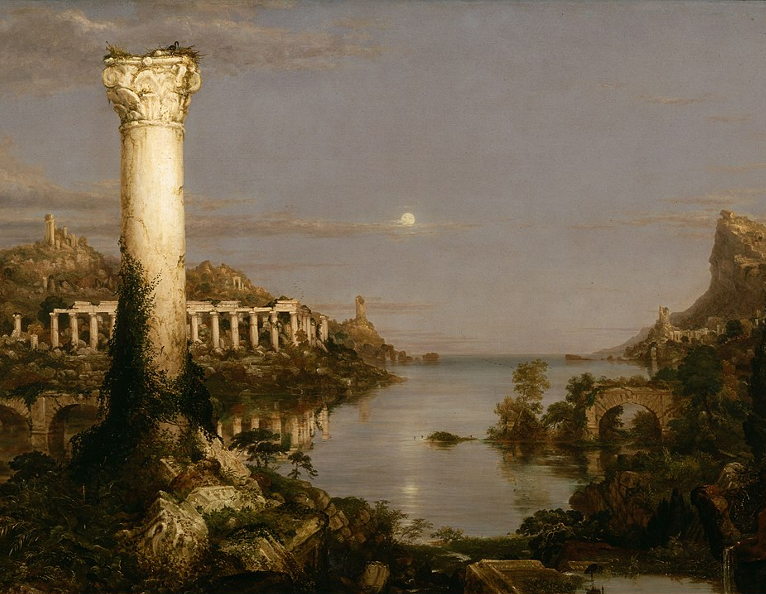“Resilience” is an alien term for those of us trained in economics. Economics is all about stable equilibria rising from a successfully solved maximization problem, based on convex second-order conditions. It is fine if that makes no sense to you…
Perhaps the obscurity is even intentional, to keep our “sacred science” unsullied by untutored intruders. Stable equilibria rest on static models based on substitution (“negative feedbacks” in systems theory), with oppositional tradeoffs in balance against each other, reaching neat, determinate outcomes. Absent endlessly ongoing dynamic change, there is no place nor any need for resilience in economic analysis.
So when I first encountered this concept, I saw it as a biological notion of little relevance to my own discipline. It was about ecological process: an ever-evolving complex system in which species survival rested on adaptation to change. There was no need for resilience in an equilibrium model that already provided “the best of all possible worlds” in its efficiency outcomes! Economists dodged that bullet.
But unfortunately, in real life, economies are ecologies – ever-moving processes of change with no equilibria anywhere. If so, to treat them as stable leads us down an imaginary path that distracts from meaning and the truth of vital life forms in all their requirements. It is, in the end, the utter inevitability of unpredictable, ongoing change that calls for resilience stemming from biodiversity across all life-forms.
I saw no need for any of that, until I embraced the daunting challenge of facing interdependence and the dynamics of endless shifting continua unlikely ever to settle into a static configuration or predictable outcome. Most economists seek continuity on connected determinate timelines shoving objective forecasts into the future ahead, so we can know what is coming toward us. The uncertainty of vital life-forms interacting chaotically yields an alien realm of disruption in the quietude of economics. Such safely stable equilibria obviate any need for adaptive facility.
When I began to realize that the economy was like an open ecology, the insight drew forth an abrupt upheaval in my understanding. Everything moves. Nothing is stable or sure. Each change instigates others, spreading ever outward to influence all that occurs in an endlessly ongoing concatenation of vitally uncertain outcomes.
This was very disturbing. Ecologists had long understood that the nice balances in economics were just an illusion based on theories severed from what transpires in our world. The whole process evolves, surprisingly and unpredictably, into an unknown future revealed through one theoretical lens, selective and so restrictively blind to all lying outside its exclusive view. We have no way to escape from that.
This scientific conundrum mandates open minds, since the more ways we can look at the world, the better our chances to get it right, to perceive fuller realms of impact from the actions we take. There is still no guarantee, but – as they say – “If all we have is a hammer, everything looks like a nail!” And if our lives are fragile flowers, that tool will lead us to harm. What does all this mean for resilience?
If every decision we face in the world – or any problem that we encounter – is inherently interdisciplinary, namely, each calls for reflection and understanding contained in no box, then we do well to understand any case from multiverse angles of vantage. Our need for ranging intelligence sings of vital agility in an era of endless shifting causes with consequential effects. Diversity yields adaptivity – or resilience – in understanding, just as it does for ecological life-forms.
This is the main notion, and the importance, of resilience. The whole life process is one of ongoing disequilibrium movement to which we must adapt to survive. It is our agility – our resilience spawned in diverse skills and talents – securing our survivability in this shifting domain. Systems adapt through biodiversity in the face of failure rising from unexpected change; lacking sufficient flexibility they become brittle and disintegrate, dissolving into the past. Will this be our destiny as well?
If we cannot tolerate difference, if we meet change as a threat, if we protect what we know from all doubt, then we deny our essential characteristic as homo sapiens: an adaptive intelligence shaped through cultural learning capacities earned through endless centuries of vital eruptions calling for resilience as our prime means to survive. This is our fate today, once again, dealing with an evolving climate threatening to consume us all if we cannot transcend the myopic character of our cultural landscape. “Precautions be damned!” we said to ourselves in our foolish, immature rage. Now we are reaping all we sowed throughout these childhood days.
We can resolve to change, to adapt, to be creative, framing new ways. Indeed, this is our essence, shaped through ages of change. All we must do is engage the Enemy, after reviewing its face in the mirror, and so restore our own nature.
Teaser photo credit: By Thomas Cole – Explore Thomas Cole, Public Domain, https://commons.wikimedia.org/w/index.php?curid=183020





